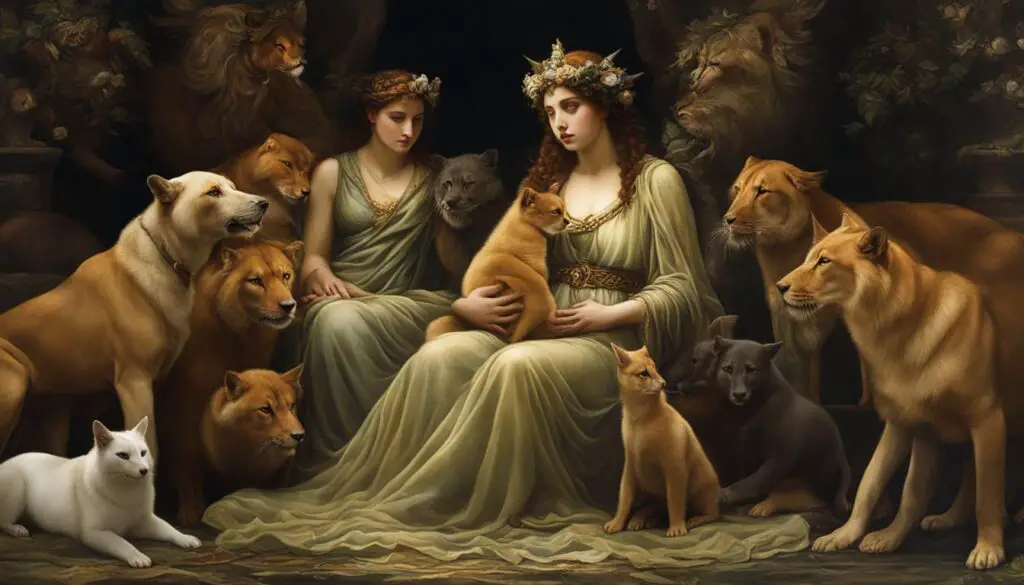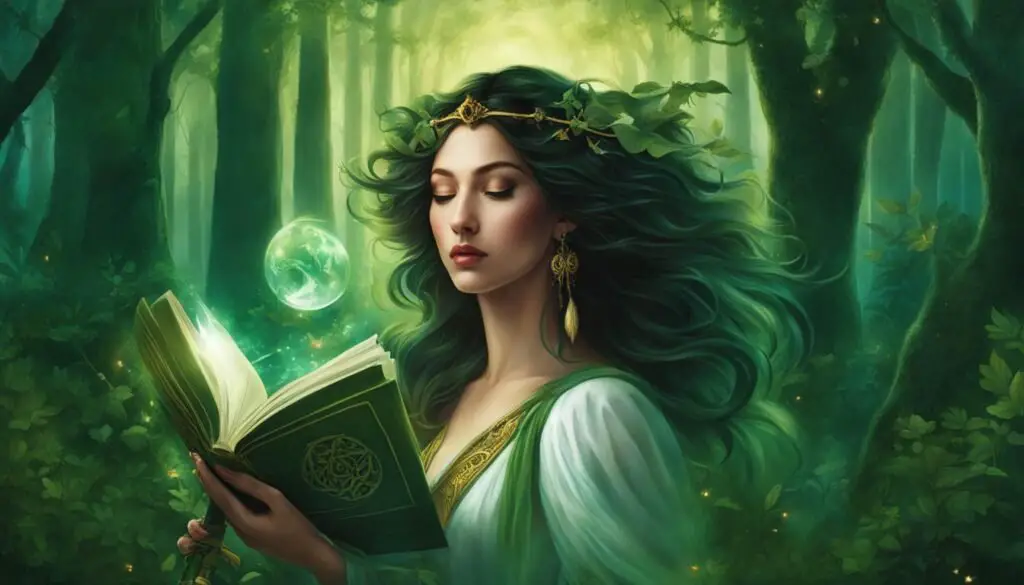Welcome to a journey through the enchanting world of Greek mythology, where gods and goddesses reign and epic tales unfold. In this article, we delve into the captivating story of Circe, the sorceress whose name echoes through the ages. From her powers and transformations to her relationships and enduring legacy, Circe’s story is one that continues to fascinate and inspire.
So, who is Circe in Greek mythology? Circe, known as the goddess of magic and a master enchantress, is prominently featured in the epic poem “The Odyssey” by Homer. Her encounters with the hero Odysseus and her bewitching abilities have made her a legendary figure in Greek culture and literature.
Circe’s powers are as mesmerizing as they are fearsome. With a mere touch or word, she has the ability to transform mortals into animals and manipulate the fabric of reality. These powers are rooted in her proficiency with magical herbs and concoctions, which she utilizes on her mystical island of Aeaea.
In “The Odyssey,” Circe’s island becomes a pivotal setting as Odysseus and his crew venture there during their perilous journey home. It is here that Circe tests the hero’s resilience and resourcefulness as she attempts to transform his men into swine. However, Odysseus, armed with his wits and the guidance of the god Hermes, resists her enchantments and ultimately finds a way to restore his crew.
Circe’s island of Aeaea is said to be a haven for witchcraft, filled with magical flora and fauna that add to its allure. The vibrant landscapes and transformed creatures serve as visual reminders of Circe’s extraordinary powers and the mystical realm she rules.
The story of Circe extends beyond her encounters with Odysseus. She is renowned for her relationships and offspring, including her sons Telegonus and Latinus who play significant roles in her mythology. Additionally, Circe’s tragic tale of revenge against the nymph Scylla highlights the complexities of her character and the consequences of her actions.
Throughout history, Circe’s significance in Greek mythology cannot be overstated. Her portrayal as a powerful enchantress and symbol of transformation has resonated with artists, authors, and creators across the ages. From ancient Greek literature to contemporary interpretations, Circe’s enduring legacy continues to captivate and inspire.
Join us as we unravel the mysteries of Circe and explore the depths of her mythology, from her origins and powers to her relationships and symbolic significance. Discover the enchantress who has bewitched the world for centuries, and find out why her story endures.
Key Takeaways:
- Circe is a prominent figure in Greek mythology, known for her bewitching powers and transformative abilities.
- She is the daughter of the sun god Helios and the nymph Perse, and her divine lineage contributes to her exceptional powers.
- Circe’s island of Aeaea is a mystical haven for witchcraft, filled with magical flora and fauna.
- Her encounter with the hero Odysseus is one of her well-known tales, showcasing her powers and his resilience.
- Circe’s relationships and offspring, as well as her vengeful actions, add both complexity and depth to her character.
The Origins of Circe: Daughter of Helios and Perse
Circe, the daughter of the sun god Helios and the nymph Perse, emerges as a formidable enchantress in Greek mythology. Her divine lineage and family ties with siblings Aeetes and Perses contribute to her exceptional abilities and establish her noteworthy position among the gods and goddesses.
Circe’s exceptional talent lies in her proficiency with magical herbs and concoctions, enabling her to manipulate and transform individuals. With unparalleled powers, she punishes her enemies and exacts revenge on those who dare to offend her.
The Divine Lineage of Circe
- Circe is the daughter of Helios, the sun god, and Perse, a nymph.
- She has siblings named Aeetes and Perses, who also possess exceptional abilities.
- Her divine lineage grants her extraordinary powers and establishes her position among the gods and goddesses of Greek mythology.
Circe’s Proficiency in Magic and Transformation
- Her exceptional talent lies in her mastery of magical herbs and concoctions.
- She has the ability to manipulate and transform individuals, either for punishment or revenge.
- Circe’s powers are unmatched, and those who cross her path often fall victim to her enchantments.
Circe’s Island of Aeaea: A Haven for Witchcraft

Aeaea, the enchanting island ruled by Circe, serves as the backdrop for her mystical prowess. It is a secluded realm brimming with magical flora and fauna. Ancient mythological accounts describe ethereal landscapes, vibrant colors, and intoxicating fragrances that infused Circe’s domain.
The island of Aeaea is teeming with transformed creatures, once men now lions and wolves, serving as a visual reminder of Circe’s extraordinary powers and the role Aeaea plays in her mythology.
Explore the captivating allure of Aeaea, where Circe weaves her enchantments and summons her magical abilities. Behold the breathtaking scenery and encounter the captivating creatures that inhabit this mystical haven.
Aeaea’s Enchanting Flora
- Aeaea is adorned with ethereal flowers that bloom in rare shades of iridescent hues, their fragrances intoxicating all who encounter them.
- The trees of Aeaea are teeming with fruits that possess magical properties, promising both pleasure and peril to those who partake.
- Herbs and plants with healing properties and transformative abilities abound, adding an air of mystery and power to Circe’s abode.
Mysterious Fauna of Aeaea
- Lions and wolves roam the lush forests of Aeaea, once men who fell victim to Circe’s transformative spells.
- The crystal-clear waters surrounding the island are home to enchanting creatures, their iridescent scales gleaming in the sunlight.
- Birds with melodic voices fill the air, their enchanting songs captivating any who listen.
Step into this magical realm and witness the wonders that Aeaea holds. Explore the mystical island, Circe’s abode, where magical flora and fauna thrive, immersing yourself in the enchantment and allure that only Aeaea can offer.
The Encounter with Odysseus: Transformation and Triumph
One of the most renowned episodes involves Circe and the Greek hero Odysseus. When Odysseus and his crew arrive at Aeaea seeking shelter and provisions, they encounter Circe’s enchanting song that lures them to her palace. Through her potent brew of cheese, barley, honey, wine, and magical herbs, Circe transforms Odysseus’ men into swine. However, protected by the magical herb given by Hermes, Odysseus manages to resist Circe’s enchantments. He devises a plan to restore his crew to their human forms, showcasing his resilience and outwitting the enchantress.
In the midst of their Aeaea encounter, Odysseus demonstrates his unwavering determination and strategic thinking. While his crew is trapped in their swine forms, Odysseus maintains his composure and seeks a resolution to their predicament. With the guidance of the god Hermes, he embarks on a journey to confront Circe once more and ultimately secure her assistance in restoring his crew to their human state.
Odysseus’ resilience shines through as he withstands Circe’s magic and transforms the tables on her, not only by ensuring the reversal of his crew’s transformation but also by persuading her to release them unharmed. This episode showcases Odysseus’ resourcefulness and intelligence, underscoring his status as a hero capable of overcoming formidable challenges.
Circe’s Relationships and Offspring

Circe, the enchantress of Greek mythology, is not only known for her bewitching powers but also for her captivating love affairs and consequential relationships. One of her most notable romantic entanglements is with the hero Odysseus.
During their encounters, Circe and Odysseus create a lasting connection that transcends time and leads to a shared legacy. Their relationship results in the birth of two sons, Telegonus and Latinus, who play significant roles in the mythological narrative surrounding Circe.
Telegonus, Circe’s son with Odysseus, becomes a prominent figure in Greek mythology. He ventures out to find his father and unwittingly brings about Odysseus’ demise. Latinus, on the other hand, is associated with the founding of the Latin race and the subsequent kingdom of Latium.
Beyond her relationship with Odysseus, Circe’s allure extends to other gods and heroes, resulting in intriguing stories of her romantic encounters and the profound influence she has on the characters of Greek mythology. Her love affairs contribute to the complexity of her character and add depth to her fascinating narrative.
The image above depicts Circe in the center, surrounded by her sons, Telegonus and Latinus, symbolizing the profound impact they have on her life and mythological legacy.
Circe’s Vengeance: The Transformation of Scylla

Circe’s story unravels a tale of unrequited love and jealousy that consumed her heart. In Greek mythology, Circe fell deeply in love with the sea god Glauco, only to have her affections ignored as he favored the nymph Scylla. Overwhelmed by her emotions, Circe sought revenge upon her romantic rival, leading to a cruel and devastating transformation.
Driven by a thirst for vengeance, Circe used her bewitching powers to forever change Scylla’s fate. In a wicked act of punishment, she transformed the nymph into a horrifying and monstrous sea creature, forever severed from her humanity and beauty. The consequences of Circe’s actions extended beyond just Scylla, shaping the lives of both individuals in tragic ways.
This tragic tale showcases the depth of Circe’s emotions and the lengths she was willing to go to seek justice for her unrequited love. It serves as a poignant reminder of the power of jealousy and the far-reaching consequences of our actions. Circe’s vengeance against Scylla stands as a testament to her formidable power and reveals the complex motivations that lie within the heart of this enchantress.
The Role of Circe in Greek Mythology

Circe holds great significance in Greek mythology, not only as a powerful deity but also as a symbol of transformation and enchantment. Her ability to turn humans into animals symbolizes the dangers of temptation and the consequences of succumbing to one’s desires.
Throughout Greek mythology, Circe’s encounters with various heroes and legends shape their journeys and fates, showcasing the challenges heroes often face. From her encounters with Odysseus and his crew to her interactions with other gods and heroes, Circe’s influence is profound.
Exploring the symbolism and themes associated with Circe provides valuable insights into the human condition and the complexities of ethical decision-making. She embodies the dual nature of power and its potential for both harm and transformation.
The Significance of Circe
- Circe represents the allure of temptation and serves as a warning against the consequences of yielding to one’s desires.
- Her power to transform humans into animals reflects the transformative nature of our own actions and decisions.
- As a symbol of enchantment, Circe highlights the importance of staying mindful and aware of the illusions and distractions that can cloud our judgment.
Influence on Heroes and Legends
- Circe’s encounters with heroes like Odysseus shape their character arcs and test their resilience, showcasing the challenges faced by those on heroic journeys.
- Her interactions with gods and heroes contribute to their own narratives, impacting their motivations and actions.
- Circe’s ability to reshape and transform the world around her often forces heroes to confront their own flaws and weaknesses, pushing them to grow and evolve.
Symbolism and Themes
- The transformational power of Circe’s magic represents the transformative journeys of individuals, the potential for personal growth, and the dangers of succumbing to temptation.
- Her enchantments serve as metaphors for the illusions and distractions that can lead individuals astray, highlighting the importance of staying true to oneself.
- The moral complexities presented in Circe’s stories raise questions about the nature of power, the consequences of our actions, and the ethical considerations that accompany them.
Overall, Circe’s role in Greek mythology extends beyond that of a mere enchantress. She represents deeper themes and meanings, highlighting the complexities of human nature and the choices we make. Through her symbolism, she continues to captivate and inspire, reminding us of the significance of our decisions and the transformative power of our actions.
Circe’s Legacy and Modern Interpretations

Circe, the enchanting sorceress of Greek mythology, continues to leave a lasting impact on literature, art, and popular culture. Her mesmerizing story and compelling character have served as inspiration for countless authors, artists, and creators throughout the ages.
In particular, Madeline Miller’s novel, Circe, has breathed new life into the legendary figure, offering readers a fresh perspective and delving deep into Circe’s character through a feminist lens. Miller’s work has received critical acclaim for its exploration of themes such as magic, transformation, and female power.
But the enchantment doesn’t stop there. Circe’s story is set to captivate audiences even further with an upcoming 8-episode television series on HBO Max, adapted from Miller’s novel. This highly anticipated series will bring Circe’s world to life, allowing viewers to immerse themselves in the intriguing mythology and witness the power of this captivating sorceress.
Whether it’s through literature, art, or television, Circe’s enduring legacy continues to captivate audiences and shed light on the complexities of magic, transformation, and female empowerment. Her story serves as a timeless reminder of the enduring power of mythology and the ability of ancient tales to resonate with modern audiences.
The Goddess Circe In History & Myth

Circe, the enchanting sorceress of Greek mythology, has a complex lineage that is often disputed. While some sources claim her as the daughter of Hecate, the goddess of witchcraft, others attribute her parentage to Helios and Perse. Regardless of her origins, Circe’s presence in Greek literature is significant, appearing in famous works such as the Argonautica and the Odyssey. Her portrayal showcases her mastery of powerful sorcery, including transmutation, illusion, and necromancy. These abilities make her an ideal deity for human witches to work with, as she herself learned her craft as a mortal.
Noteworthy Appearances in Greek Literature
- The Argonautica: Circe features in this epic poem as she aids the hero Jason and his crew on their quest for the Golden Fleece. Her knowledge and assistance play a crucial role in their successful journey.
- The Odyssey: Circe’s encounter with the hero Odysseus is a central part of this renowned epic. Through her transformative powers, she challenges Odysseus and his crew, testing their resilience and tenacity.
The captivating portrayal of Circe in these literary works highlights her power and influence, showcasing her as a formidable force in both mythology and human narratives.
How Do You Know If The Goddess Circe Is Calling To You?

The Goddess Circe has a significant role in the realm of witchcraft and energy manipulation. If you possess a strong desire to practice witchcraft and work with the manipulation of energy, you may feel a deep connection with Circe. Individuals intrigued by herbalism, potions, illusions, and transformation magic are also likely to resonate with her essence.
There are several signs that Circe may be reaching out to you. Firstly, you may feel a strong pull towards practicing magic, a desire to embrace solitude, and a yearning to immerse yourself in nature. These inclinations often indicate an alignment with Circe’s energy and teachings.
Additionally, if you have an interest in learning from a skilled teacher who can help you harness and manipulate energy, it could be a sign that Circe is calling to you. She offers guidance and wisdom to those who seek spiritual growth and transformation.
Working with Circe can bring forth personal empowerment, a deep connection to the natural world, and a profound understanding of the mysteries of magic. If you resonate with the signs and symbols associated with Circe, it may be an indication that the Goddess is inviting you to explore the realms of herbalism, transformation, and witchcraft.
Conclusion
Circe, the enchantress of Greek mythology, holds a remarkable place in our collective imagination. Her story, with its intricate layers and powerful themes, continues to captivate and inspire audiences today. Through literature, art, and modern interpretations, Circe’s enduring legacy remains alive and vibrant.
In ancient Greek culture, Circe symbolizes the power of transformation and the complexities of human nature. Her influence on heroes and legends, such as Odysseus, highlights the challenges they face and the choices they make. Circe’s mythology serves as a reminder of the profound impact of desires, choices, and the consequences that follow.
From her mystical island of Aeaea to her encounters with gods and mortals, Circe’s tale weaves themes of temptation, revenge, and resilience. Through her enchanting powers, she explores the shadows within us, the tragic and beautiful aspects of our own humanity.
As we delve into the realms of Greek mythology, Circe’s story calls upon us to confront our own desires, face our own transformations, and embrace the complexities that make us who we are. Through her enduring legacy, Circe not only reminds us of the power of Greek mythology but also invites us to explore the depths of our own souls.
FAQ
Who is Circe in Greek mythology?
Circe is an enchantress and a prominent figure in Greek mythology known for her bewitching powers and transformative abilities.
What is Circe’s role in “The Odyssey”?
Circe plays a significant role in “The Odyssey” as she transforms Odysseus’ crew into swine and tests Odysseus’ resilience and wit.
What are Circe’s powers?
Circe possesses exceptional powers in transmutation, illusion, and necromancy, allowing her to manipulate and transform individuals.
Where is Circe’s island?
Circe resides on the mystical island of Aeaea, a secluded realm known for its magical flora and fauna.
What happens when Odysseus encounters Circe?
Odysseus and his crew encounter Circe on Aeaea, where she transforms his crew into swine. However, using a magical herb given by Hermes, Odysseus resists her enchantments and devises a plan to restore his crew to human form.
What are Circe’s notable relationships?
Circe has a significant relationship with the Greek hero Odysseus, resulting in the birth of their two sons, Telegonus and Latinus.
How does Circe seek revenge on the nymph Scylla?
Driven by unrequited love and jealousy, Circe transforms Scylla into a horrifying sea monster as a cruel revenge.
What is the significance of Circe in Greek mythology?
Circe holds great significance as a symbol of transformation and enchantment, representing the dangers of temptation and the consequences of yielding to desires.
How has Circe’s story influenced literature and popular culture?
Circe’s captivating mythology has inspired various works of literature, art, and popular culture, including Madeline Miller’s novel “Circe,” which explores her character in a feminist light.
What is known about the parentage and powers of Circe?
The parentage of Circe is disputed, with some sources claiming her as the daughter of Hecate, the goddess of witchcraft, while others attribute her lineage to Helios and Perse. Circe is described as a powerful sorceress with abilities in transmutation, illusion, and necromancy.
How do you know if the goddess Circe is calling to you?
Signs that Circe may be reaching out include a strong desire to practice witchcraft, an interest in herbalism, potions, illusions, and transformation magic, and a pull towards solitude and nature.




